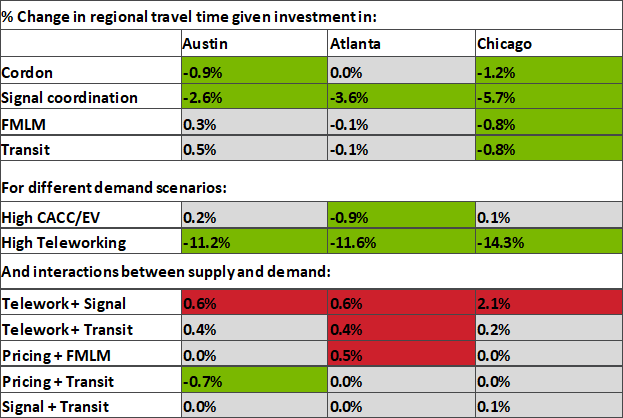Transportation Decarbonization Solutions are Local
Addressing Transportation Decarbonization Demands Tailored Solutions with a Local Focus
A transportation system study conducted by Argonne National Laboratory researchers across multiple metropolitan areas and scenarios emphasizes the need for tailored responses to address specific challenges in different regions. Solutions should take into account both local conditions and how various transport and mobility interventions may interact.
Argonne researchers considered four transportation system interventions—cordon pricing, adaptive signal deployment, first-mile/last-mile (FMLM) subsidized travel to transit stops, and transit frequency improvement—individually and in combination across Austin, Atlanta, and Chicago. Further, researchers explored the interventions in the context of two potential demand futures: high deployment of cooperative adaptive cruise control-enabled and electrified vehicles and high teleworking and e-commerce usage.

While the majority of strategies reduce travel time, interactions can affect impact. In Chicago, for example, a combination of subsidized FMLM with cordon pricing effectively reduces travel time by using the city’s commuter rail system to expand the reach of the cordon policy. Commuters can take the train to the cordon zone, then switch to FMLM for their last leg.
In short, encouraging people to use Chicago’s current train system can cut travel time and boost mobility. Austin, on the other hand, is less oriented towards a hub and spoke system and can instead reduce travel times by increasing transit bus frequency and implementing a cordon charge.
To further support local decision making, Argonne researchers are now studying a total of 12 metropolitan areas covering 20% of the U.S. population.
The study was funded by the US Department of Energy (DOE) Vehicle Technologies Office (VTO) Energy Efficient Mobility Systems (EEMS).